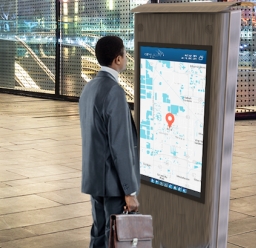How remote monitoring can enhance your software platform
By Paul Burden, Director of Software – Meridian
Businesses across the globe are continuing to invest in digital signage and kiosk technology to personalize customer experiences. Kiosk and digital signage solutions have revolutionized industries from tourism to insurance by allowing companies to utilize self-service solutions for simple transactions, allowing employees to focus on more complicated customer service tasks. This amounts to companies being able to shift costly labor resources into more vital business roles. Businesses and organizations are deploying self-service solutions to maximize customer reach, generate additional revenue opportunities and deliver expanded services.
However, when devices need to operate independently in an unattended environment, there are some obvious concerns that must be addressed. What is done to secure the physical kiosk or digital signage from tampering? This is especially important when it comes to transactional kiosks that handle payment. Additionally, how is a deployer notified of issues with kiosks in the field? If a deployer is relying heavily on more labor to address these issues, any gains made by deploying a self-service solution would likely evaporate. Remote monitoring offers a solution for these concerns and adds additional benefits to kiosks and digital signage. Here are just a few key ways remote monitoring enhances software for kiosk and digital signage solutions:
Remote Access
One of the most valuable features a software platform can offer is the ability to be accessed remotely by non technical users. Rather than hiring a coding expert to change the URL of the kiosk, business and organizations can change the content of the kiosk or digital signage from their any computer connected to the internet. Remote access allows kiosk deployers to automatically schedule and change content based on current needs. For example, a company may want its digital signage to display advertisements for family activities and open shops during the day and, in the evening cater to a more mature audience by displaying advertisements for dinner specials and events.
Monitor Health
Remote monitoring solutions can give deployers the ability to monitor the health of the kiosk operating system and software, along with accompanying hardware, in real time. Deployers can be notified if either the physical unit or the software has been accessed inappropriately, either by email or text message.
Multi-user Access
With remote monitoring, your software platform will be able to support multi-permission level access. Multi-user access can be used for alerts, security updates and pushing new content to the kiosk or digital signage. In some cases, a generic user might be limited to their own account, content and alerts. The IT team account might have access to manage all accounts and alerts, as well as the ability to push security updates and software to the device.
Customizable Alarms
Remote monitoring allows deployers to customize what the severity of each alarm is and determine who an alert should go to. For instance, if a low paper roll is 80-percent empty, that alert might go to the local store owner. When the low paper reaches 90-percent empty, that alert could be escalated and sent to the district manager who is able to call the store to find out why it’s not being replaced.
Analytics
Finally, a great remote monitoring solution should offer measurable ROI with the ability to pull logs, diagnostics and usage information reports from the kiosk and digital signage. A comprehensive remote monitoring solution should provide the deployer with reports including information about the number of users who interact with the system and the duration, where and what the user interacted with, viewed, touched, etc. While this information is valuable for IT purposes, it can also be leveraged for marketing research. It can even give deployers insight into changes that may need to be made in the user interface.
Remote monitoring is important because it helps companies protect their kiosk or digital signage investment. Even more, remote monitoring can go a long way to ensure ROI. Most importantly, a sound remote monitoring solution helps companies improve the customer experience at the kiosk. We will dive a bit deeper into that next week as we discuss self-service kiosk apps — what they are, what they are not, and what they should be.



